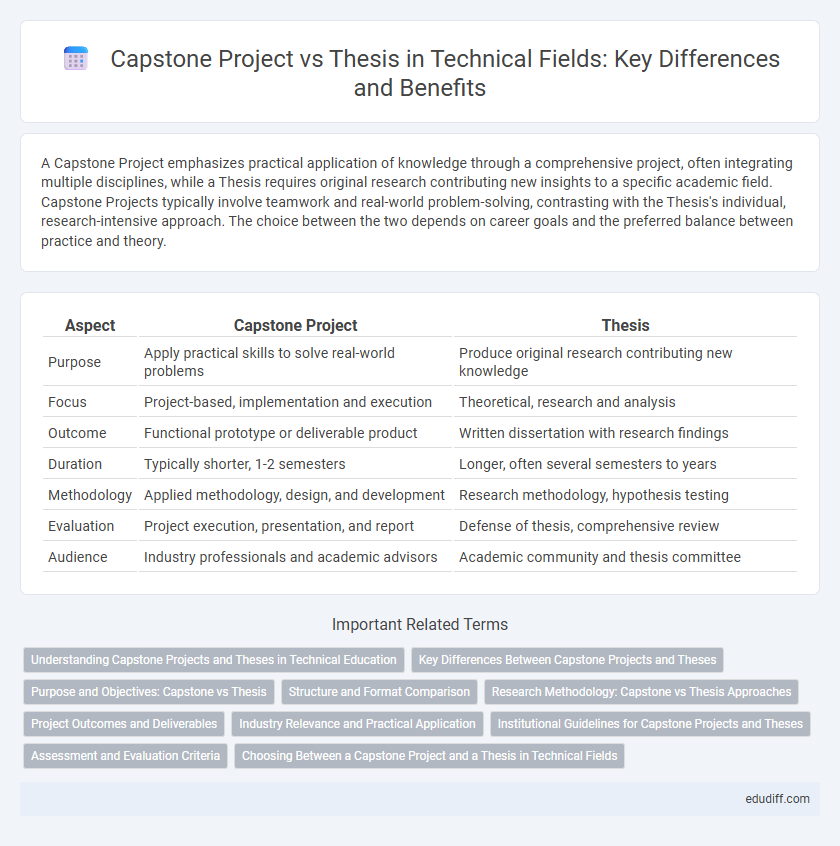A Capstone Project emphasizes practical application of knowledge through a comprehensive project, often integrating multiple disciplines, while a Thesis requires original research contributing new insights to a specific academic field. Capstone Projects typically involve teamwork and real-world problem-solving, contrasting with the Thesis's individual, research-intensive approach. The choice between the two depends on career goals and the preferred balance between practice and theory.
Table of Comparison
| Aspect | Capstone Project | Thesis |
|---|---|---|
| Purpose | Apply practical skills to solve real-world problems | Produce original research contributing new knowledge |
| Focus | Project-based, implementation and execution | Theoretical, research and analysis |
| Outcome | Functional prototype or deliverable product | Written dissertation with research findings |
| Duration | Typically shorter, 1-2 semesters | Longer, often several semesters to years |
| Methodology | Applied methodology, design, and development | Research methodology, hypothesis testing |
| Evaluation | Project execution, presentation, and report | Defense of thesis, comprehensive review |
| Audience | Industry professionals and academic advisors | Academic community and thesis committee |
Understanding Capstone Projects and Theses in Technical Education
Capstone projects in technical education emphasize applied skills by requiring students to develop practical solutions to real-world problems, integrating knowledge from multiple disciplines. Theses focus on original research, demanding rigorous methodology, critical analysis, and contribution to academic knowledge within a specific technical field. Both formats aim to demonstrate mastery but differ in scope, with capstones prioritizing practical application and theses emphasizing theoretical investigation.
Key Differences Between Capstone Projects and Theses
Capstone projects emphasize practical application and hands-on experience by solving real-world problems, while theses focus on original research and theoretical analysis within a specific academic field. Capstones typically involve teamwork and deliverables like prototypes or business plans, whereas theses require extensive literature review and a formal written dissertation. The evaluation criteria for capstone projects prioritize implementation and outcome demonstration, contrasting with the thesis emphasis on research methodology and scholarly contribution.
Purpose and Objectives: Capstone vs Thesis
Capstone projects emphasize practical application and real-world problem-solving within a specific field, aiming to demonstrate students' ability to integrate and apply knowledge through hands-on experience. Thesis objectives focus on contributing original research to academic knowledge by formulating hypotheses, conducting systematic investigations, and analyzing data to support theoretical frameworks. The capstone's purpose is skill demonstration and professional preparation, whereas the thesis prioritizes scholarly contribution and theoretical advancement.
Structure and Format Comparison
A Capstone Project typically involves practical application through a structured project report consisting of a problem statement, methodology, implementation, and results, emphasizing real-world solutions. In contrast, a Thesis follows a formal academic structure with an abstract, literature review, hypothesis, methodology, data analysis, and conclusion, prioritizing original research and theoretical contribution. While both formats require detailed documentation, the Thesis demands rigorous citation and extensive theoretical background, whereas the Capstone focuses on applied outcomes and project deliverables.
Research Methodology: Capstone vs Thesis Approaches
Capstone projects typically employ applied research methodologies that emphasize practical problem-solving and real-world application, often using qualitative or mixed methods to develop actionable outcomes. Thesis research methodologies are generally more rigorous and theoretical, focusing on hypothesis testing, systematic data collection, and analysis, often relying on quantitative or experimental methods to contribute to academic knowledge. The choice between capstone and thesis research approaches depends on the project's objectives, with capstones aimed at immediate practical impact and theses designed for scholarly contribution.
Project Outcomes and Deliverables
Capstone projects emphasize practical application and produce tangible deliverables such as prototypes, software, or comprehensive project reports that demonstrate real-world problem-solving skills. Thesis outcomes focus on original research contributions, culminating in a detailed document presenting hypotheses, methodology, data analysis, and scholarly findings. Both deliverables serve distinct academic purposes: capstone projects showcase implementation abilities, while theses advance theoretical knowledge.
Industry Relevance and Practical Application
A Capstone Project emphasizes direct industry relevance by addressing real-world problems through practical application, often developed in collaboration with companies or organizations. In contrast, a Thesis primarily focuses on theoretical research aimed at advancing academic knowledge, with less immediate application to industry challenges. Capstone Projects typically result in tangible solutions or prototypes, enhancing employability and skills aligned with market demands.
Institutional Guidelines for Capstone Projects and Theses
Institutional guidelines for capstone projects typically emphasize practical application and interdisciplinary collaboration, requiring students to demonstrate problem-solving skills through real-world projects within a set timeframe. Thesis guidelines focus on original research contributions, demanding rigorous methodology, comprehensive literature reviews, and adherence to strict formatting and academic standards established by the graduate school. Both require approval from faculty advisors and compliance with ethical standards, but theses often undergo a formal defense process, while capstone projects may culminate in presentations or portfolios.
Assessment and Evaluation Criteria
Capstone projects are typically assessed based on practical application, problem-solving skills, and project execution, emphasizing real-world impact and deliverables. Thesis evaluation prioritizes originality, depth of research, methodology rigor, and critical analysis, often requiring defense before an academic committee. Both assessments measure analytical thinking but differ in emphasis, with capstones focusing on applied outcomes and theses on theoretical contributions.
Choosing Between a Capstone Project and a Thesis in Technical Fields
Choosing between a capstone project and a thesis in technical fields depends on career goals and learning preferences. Capstone projects emphasize practical application and problem-solving with industry-relevant technologies, ideal for those seeking immediate workforce entry. Theses focus on original research and contribute to academic knowledge, suited for students aiming for advanced study or research-intensive roles.
Capstone Project vs Thesis Infographic

 edudiff.com
edudiff.com